When it comes to the performance and safety of your BMW, the choice of brake pads is a crucial factor. Among the various options available, ceramic brake pads have gained attention for their potential advantages. In this exploration, we delve into the world of BMW brake pads, specifically focusing on whether they are made of ceramic materials. We’ll unravel the benefits of ceramic brake pads, their compatibility with BMW vehicles, and what you should consider when it’s time to replace your brake pads. Join us on this journey to understand the role of ceramic brake pads in enhancing your BMW’s stopping power and driving experience.
Are bmw brake pads ceramic?
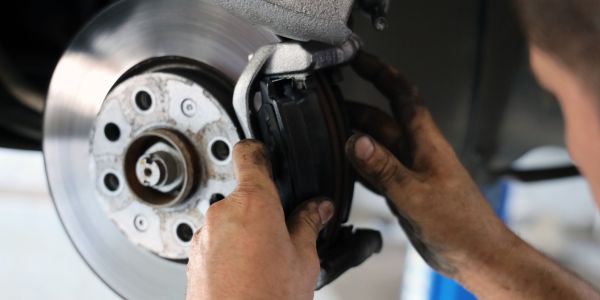
Yes, some BMW brake pads are made of ceramic materials. BMW offers a range of brake pad options, and ceramic brake pads are among them. However, it’s essential to note that not all BMW models come equipped with ceramic brake pads by default. The specific type of brake pads used can vary depending on the BMW model and trim level. When considering brake pad replacements for your BMW, it’s advisable to consult your vehicle’s manual or contact a BMW dealership or mechanic to ensure you select the appropriate brake pads for your specific vehicle.
Are all bmw brake pads ceramic?
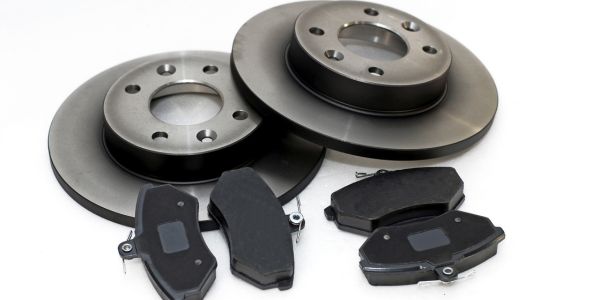
No, not all BMW brake pads are ceramic. BMW offers a range of brake pad options, and the type of brake pads used can vary depending on the BMW model and trim level. While some BMW models may come equipped with ceramic brake pads by default, others may use semi-metallic or organic brake pads.
The choice of brake pad material can depend on factors such as the vehicle’s intended use, performance requirements, and cost considerations. Ceramic brake pads are known for their low noise, reduced dust, and consistent performance but may be more commonly found on higher-end or performance-oriented BMW models.
If you’re unsure about the type of brake pads your BMW uses or if you’re considering a brake pad replacement, it’s recommended to consult your vehicle’s manual or contact a BMW dealership or mechanic to ensure you select the appropriate brake pads for your specific vehicle and driving needs.
Types of material for BMW brake pads

BMW offers various types of brake pad materials to cater to different driving needs and preferences. The most common types of brake pad materials used in BMW vehicles include:
- Ceramic Brake Pads: Ceramic brake pads are known for their low noise, reduced dust production, and consistent performance. They provide smooth and quiet braking while offering good stopping power. Ceramic pads are often used in luxury and high-performance BMW models.
- Semi-Metallic Brake Pads: Semi-metallic brake pads contain a mix of metals such as copper, iron, and steel. They are known for their durability and heat resistance, making them suitable for high-performance and heavy-duty applications. Semi-metallic pads may produce more dust and noise compared to ceramic pads but offer excellent stopping power.
- Organic Brake Pads: Organic or non-metallic brake pads are made from materials like rubber, glass, and resin. They provide a smooth and quiet braking experience but may wear out faster than ceramic or semi-metallic pads. They are often used in standard passenger vehicles and are less common in high-performance BMW models.
- Performance and Racing Brake Pads: BMW also offers high-performance and racing brake pads for enthusiasts who demand exceptional braking performance. These pads are typically designed for track use and may be composed of specialized materials to withstand extreme heat and stress.
The choice of brake pad material depends on factors such as your BMW model, driving style, and intended use. Luxury and performance-oriented BMW models often come equipped with ceramic or high-performance brake pads, while standard passenger vehicles may use semi-metallic or organic pads. When considering a brake pad replacement, it’s essential to select the type that aligns with your driving needs and preferences. Consulting your vehicle’s manual or a BMW dealership can help you choose the right brake pads for your specific BMW model.
Ceramic vs other brake pads for BMW car
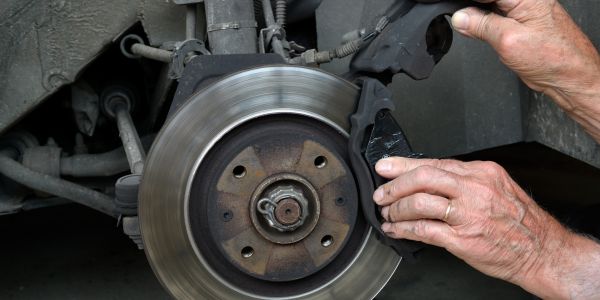
When choosing between ceramic and other types of brake pads for your BMW car, it’s essential to consider various factors, including your driving style, performance requirements, and personal preferences. Here’s a comparison between ceramic brake pads and other common types:
Ceramic Brake Pads:
- Advantages:
- Low Noise: Ceramic pads are known for their quiet operation, making for a more comfortable driving experience.
- Reduced Dust: They produce less brake dust compared to other types, helping to keep your wheels cleaner.
- Consistent Performance: Ceramic pads offer consistent braking performance across various temperature ranges.
- Good for Daily Driving: They are well-suited for standard commuting and daily driving.
- Considerations:
- Cost: Ceramic brake pads can be more expensive than some other options.
- Performance: While they provide good braking performance for most situations, they may not be ideal for heavy-duty or high-performance driving.
Semi-Metallic Brake Pads:
- Advantages:
- Durability: Semi-metallic pads are durable and capable of handling high-stress situations.
- Excellent Heat Dissipation: They are effective at dissipating heat, making them suitable for performance and heavy-duty applications.
- Strong Stopping Power: Semi-metallic pads can provide strong and reliable stopping power.
- Considerations:
- Noise and Dust: They may produce more noise and brake dust compared to ceramic pads.
- Potential Rotor Wear: The metal content in semi-metallic pads may lead to increased wear on brake rotors.
Organic Brake Pads:
- Advantages:
- Smooth and Quiet: Organic pads offer a smooth and quiet braking experience.
- Environmentally Friendly: They are made from natural materials and are considered more environmentally friendly.
- Softer on Rotors: They tend to be softer on brake rotors, potentially extending rotor life.
- Considerations:
- Reduced Performance: Organic pads may not provide the same level of performance as ceramic or semi-metallic pads, particularly in high-stress situations.
- Wear Rate: They may wear out faster than other types of brake pads, requiring more frequent replacements.
Performance and Racing Brake Pads:
- Advantages:
- Exceptional Performance: Designed for high-performance and racing applications, these pads offer superior stopping power and heat resistance.
- Track-Ready: They excel in extreme conditions, such as track days, where repeated hard braking is common.
- Considerations:
- Noise and Dust: Performance and racing pads can produce more noise and dust compared to standard pads.
- Limited Street Use: They may not be suitable for daily street driving due to their aggressive nature and higher rotor wear.
In summary, the choice between ceramic and other brake pads for your BMW car depends on your driving needs and preferences. Ceramic pads are an excellent choice for quiet and low-dust daily driving, while semi-metallic pads offer durability and strong performance for more demanding situations. Organic pads are an eco-friendly option but may not deliver the same performance, and performance/racing pads are reserved for enthusiasts seeking top-tier braking capabilities on the track. Consider your specific driving conditions and priorities when making your decision.
Which brake pad is good for BMW car?
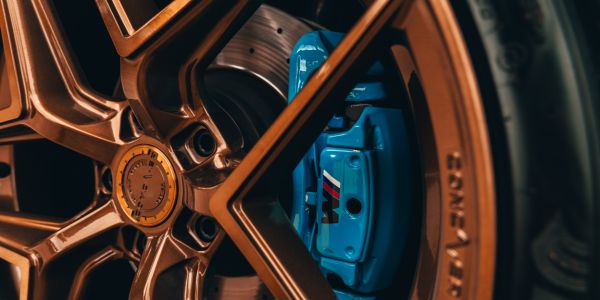
The choice of brake pads for your BMW car depends on your driving style, preferences, and the specific model of your BMW. BMW offers a range of brake pad options, each designed to meet different needs. Here are some considerations to help you determine which brake pads may be suitable for your BMW:
Ceramic Brake Pads:
Ceramic brake pads are a good choice for most BMWs, especially if you prioritize a quiet and low-dust braking experience for daily driving. They offer consistent performance and are suitable for regular commuting and city driving.
Semi-Metallic Brake Pads:
Semi-metallic brake pads are a great option if you demand strong and reliable stopping power, such as for spirited driving or if you have a high-performance BMW model. They can handle high-stress situations and provide excellent heat dissipation.
Performance Brake Pads:
If you own a high-performance BMW and intend to use it on the track or in aggressive driving scenarios, consider performance brake pads specifically designed for such applications. These pads offer exceptional performance but may produce more noise and dust and wear out faster during daily street use.
OEM (Original Equipment Manufacturer) Brake Pads:
BMW’s OEM brake pads are designed to meet the manufacturer’s specifications and are typically a safe choice. They are engineered to provide a balance of performance, durability, and comfort. If you’re happy with the factory braking performance of your BMW, sticking with OEM brake pads may be a sensible option.
Driving Conditions:
Consider your typical driving conditions. If you mainly use your BMW for city commuting and highway driving, standard ceramic or semi-metallic pads should suffice. If you frequently encounter extreme conditions, such as mountain driving or heavy traffic, you may want to prioritize specific characteristics like noise reduction or heat resistance.
Budget:
Your budget is a significant factor in selecting brake pads. Ceramic pads are often more affordable than semi-metallic or performance pads. Consider how much you’re willing to invest in your brake system.
Consultation:
If you’re uncertain about the best brake pad choice for your BMW, it’s advisable to consult with a BMW dealership or a qualified mechanic. They can provide recommendations based on your specific BMW model and driving habits.
Ultimately, the “best” brake pads for your BMW depend on your unique needs and preferences. Prioritize factors like performance, noise, dust, and budget to determine the most suitable option for your driving experience.
How to insert ceramic brake pads from BMW car
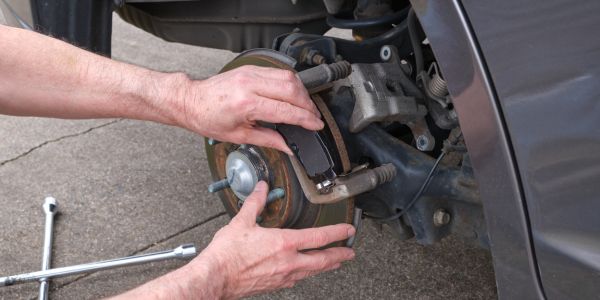
Replacing ceramic brake pads on a BMW car requires some mechanical skill and the right tools. Here’s a general guide on how to insert ceramic brake pads:
Note: Before you start, ensure you have the necessary tools and equipment, including a jack, jack stands, lug wrench, a C-clamp or brake caliper tool, a torque wrench, and new ceramic brake pads.
Safety Precautions
- Park your BMW on a level surface and engage the parking brake.
- Wear safety glasses and gloves to protect yourself from dust and debris.
Elevate the Car
- Use a jack to lift the car off the ground and secure it on jack stands. Make sure it’s stable and safe to work underneath.
Remove the Wheel
- Use a lug wrench to remove the wheel covering the brake assembly. Place the wheel aside.
Access the Brake Caliper
- Locate the brake caliper, which is the component that encloses the brake pads. It’s usually held in place by two bolts on the backside.
Loosen the Caliper Bolts
- Carefully use a wrench to loosen and remove the caliper bolts. This will allow you to pivot the caliper upward.
Remove the Old Pads
- Slide out the old brake pads from the caliper bracket. Pay attention to how they are positioned, as you’ll need to replicate this with the new pads.
Compress the Caliper Piston
- To make room for the new, thicker brake pads, you’ll need to compress the caliper piston. You can do this using a C-clamp or a brake caliper tool. Be gentle to avoid damaging the piston.
Insert the New Pads
- Place the new ceramic brake pads into the caliper bracket, ensuring they are positioned correctly as per the old pads.
Reattach the Caliper
- Carefully pivot the caliper back into place over the new brake pads.
- Tighten the caliper bolts securely.
Reattach the Wheel
- Put the wheel back onto the wheel hub and tighten the lug nuts. Use a torque wrench to ensure proper torque settings.
Lower the Car
- Carefully lower the car off the jack stands using the jack.
Bed the Brake Pads
- To ensure optimal performance, follow the manufacturer’s instructions for bedding in the new ceramic brake pads. This typically involves a series of gradual stops to properly seat the pads.
Test Drive
- Take your BMW for a short test drive to ensure that the brakes are functioning correctly. Listen for any unusual noises or vibrations.
Remember that this is a general guide, and the specific steps may vary depending on your BMW model and year. If you’re not confident in your ability to perform this task or if you have any doubts, it’s advisable to seek professional assistance from a certified mechanic or BMW dealership. Proper brake maintenance is crucial for your safety, so it’s essential to ensure the job is done correctly.
FAQ’s
Certainly, here are some frequently asked questions (FAQs) about BMW brake pads, specifically addressing whether BMW brake pads are ceramic:
Are all BMW brake pads ceramic?
No, not all BMW brake pads are ceramic. BMW offers various types of brake pad materials, including ceramic, semi-metallic, and others, depending on the model and trim level.
Are ceramic brake pads better for BMWs?
Ceramic brake pads are known for their low dust and quiet operation, making them suitable for many BMW models, especially for daily driving. However, the choice between ceramic and other materials depends on individual preferences and driving conditions.
What are the advantages of using ceramic brake pads in a BMW?
Ceramic brake pads offer reduced brake dust, low noise, and consistent performance. They are suitable for daily driving and provide a comfortable and clean braking experience.
Do ceramic brake pads provide better performance for high-performance BMWs?
While ceramic brake pads offer good performance, high-performance BMW models may benefit from semi-metallic or performance brake pads designed to handle more demanding driving conditions and offer higher heat resistance.
Are ceramic brake pads more expensive for BMWs?
Ceramic brake pads can be more expensive than some other options, but the cost can vary depending on the specific BMW model and where you purchase them.
Can I replace non-ceramic BMW brake pads with ceramic ones?
In many cases, you can replace non-ceramic brake pads with ceramic ones, but it’s essential to consult your BMW’s manual and ensure that the ceramic pads are compatible with your specific model.
Are ceramic brake pads suitable for track or performance driving in a BMW?
Ceramic brake pads are typically designed for daily driving and may not provide the same level of performance and heat resistance as specialized performance brake pads. If you plan to engage in track or aggressive driving, consider dedicated performance brake pads.
How can I identify whether my BMW has ceramic brake pads installed?
To determine the type of brake pads in your BMW, you can check your vehicle’s manual or consult with a BMW dealership or mechanic. They can provide information on the original equipment installed in your specific model.
Do ceramic brake pads require any special maintenance for BMWs?
Ceramic brake pads are generally low-maintenance. However, it’s crucial to follow regular brake maintenance practices, such as inspecting and servicing the brake system at recommended intervals, to ensure safe and efficient braking performance.
Are ceramic brake pads suitable for all BMW models?
Ceramic brake pads are suitable for many BMW models, but the suitability may vary depending on factors like the model’s weight, performance characteristics, and driving conditions. Always check your BMW’s specifications and consult with experts when selecting brake pads.
Conclusion
In conclusion, the question of whether BMW brake pads are ceramic has shed light on the diverse options available to BMW owners when it comes to maintaining their vehicle’s braking system. While ceramic brake pads have garnered attention for their benefits, including low dust, quiet operation, and consistent performance, it’s essential to recognize that BMW offers a range of brake pad materials to cater to different driving needs and preferences.
The choice between ceramic, semi-metallic, or other brake pad materials ultimately depends on individual priorities. Whether you seek a clean and comfortable daily driving experience, robust performance for spirited drives, or specialized braking capabilities for track days, BMW has options to match your requirements.
The key takeaway is the importance of considering your specific BMW model, driving habits, and personal preferences when selecting brake pads. Consultation with BMW experts, such as dealership professionals or certified mechanics, can be invaluable in making the right choice for your BMW’s braking system.
In the world of automotive safety and performance, the ability to choose the right brake pads ensures that your BMW maintains its stopping power and driving experience at the highest standard. So, whether your BMW’s brake pads are ceramic or another material, the priority is always safety, comfort, and the thrill of the drive.